[English] 日本語
 Yorodumi
Yorodumi- EMDB-33624: CryoEM structure of PS1-containing gamma-secretase in complex wit... -
+ Open data
Open data
- Basic information
Basic information
| Entry |  | |||||||||
|---|---|---|---|---|---|---|---|---|---|---|
| Title | CryoEM structure of PS1-containing gamma-secretase in complex with MRK-560 | |||||||||
 Map data Map data | CryoEM structure of human PS1-containing gamma-secretase in complex with MRK-560 | |||||||||
 Sample Sample |
| |||||||||
| Function / homology |  Function and homology information Function and homology informationCajal-Retzius cell differentiation / positive regulation of L-glutamate import across plasma membrane / amyloid precursor protein biosynthetic process / positive regulation of coagulation / protein catabolic process at postsynapse / negative regulation of core promoter binding /  gamma-secretase complex / aspartic endopeptidase activity, intramembrane cleaving / short-term synaptic potentiation / positive regulation of amyloid precursor protein biosynthetic process ...Cajal-Retzius cell differentiation / positive regulation of L-glutamate import across plasma membrane / amyloid precursor protein biosynthetic process / positive regulation of coagulation / protein catabolic process at postsynapse / negative regulation of core promoter binding / gamma-secretase complex / aspartic endopeptidase activity, intramembrane cleaving / short-term synaptic potentiation / positive regulation of amyloid precursor protein biosynthetic process ...Cajal-Retzius cell differentiation / positive regulation of L-glutamate import across plasma membrane / amyloid precursor protein biosynthetic process / positive regulation of coagulation / protein catabolic process at postsynapse / negative regulation of core promoter binding /  gamma-secretase complex / aspartic endopeptidase activity, intramembrane cleaving / short-term synaptic potentiation / positive regulation of amyloid precursor protein biosynthetic process / Noncanonical activation of NOTCH3 / positive regulation of endopeptidase activity / choline transport / Notch receptor processing / sequestering of calcium ion / gamma-secretase complex / aspartic endopeptidase activity, intramembrane cleaving / short-term synaptic potentiation / positive regulation of amyloid precursor protein biosynthetic process / Noncanonical activation of NOTCH3 / positive regulation of endopeptidase activity / choline transport / Notch receptor processing / sequestering of calcium ion /  central nervous system myelination / synaptic vesicle targeting / central nervous system myelination / synaptic vesicle targeting /  membrane protein intracellular domain proteolysis / negative regulation of axonogenesis / membrane protein intracellular domain proteolysis / negative regulation of axonogenesis /  regulation of resting membrane potential / T cell activation involved in immune response / NOTCH4 Activation and Transmission of Signal to the Nucleus / skin morphogenesis / regulation of resting membrane potential / T cell activation involved in immune response / NOTCH4 Activation and Transmission of Signal to the Nucleus / skin morphogenesis /  growth factor receptor binding / neural retina development / dorsal/ventral neural tube patterning / regulation of synaptic vesicle cycle / L-glutamate import across plasma membrane / myeloid dendritic cell differentiation / Regulated proteolysis of p75NTR / growth factor receptor binding / neural retina development / dorsal/ventral neural tube patterning / regulation of synaptic vesicle cycle / L-glutamate import across plasma membrane / myeloid dendritic cell differentiation / Regulated proteolysis of p75NTR /  regulation of phosphorylation / metanephros development / locomotion / brain morphogenesis / glutamate receptor signaling pathway / endoplasmic reticulum calcium ion homeostasis / nuclear outer membrane / smooth endoplasmic reticulum calcium ion homeostasis / amyloid precursor protein metabolic process / astrocyte activation involved in immune response / regulation of canonical Wnt signaling pathway / regulation of phosphorylation / metanephros development / locomotion / brain morphogenesis / glutamate receptor signaling pathway / endoplasmic reticulum calcium ion homeostasis / nuclear outer membrane / smooth endoplasmic reticulum calcium ion homeostasis / amyloid precursor protein metabolic process / astrocyte activation involved in immune response / regulation of canonical Wnt signaling pathway /  aggresome / regulation of long-term synaptic potentiation / embryonic limb morphogenesis / aggresome / regulation of long-term synaptic potentiation / embryonic limb morphogenesis /  skeletal system morphogenesis / cell fate specification / regulation of postsynapse organization / skeletal system morphogenesis / cell fate specification / regulation of postsynapse organization /  ciliary rootlet / myeloid cell homeostasis / azurophil granule membrane / dopamine receptor signaling pathway / ciliary rootlet / myeloid cell homeostasis / azurophil granule membrane / dopamine receptor signaling pathway /  Hydrolases; Acting on peptide bonds (peptidases); Aspartic endopeptidases / Golgi cisterna membrane / positive regulation of amyloid fibril formation / Hydrolases; Acting on peptide bonds (peptidases); Aspartic endopeptidases / Golgi cisterna membrane / positive regulation of amyloid fibril formation /  adult behavior / positive regulation of receptor recycling / positive regulation of dendritic spine development / mitochondrial transport / positive regulation of catalytic activity / regulation of neuron projection development / heart looping / blood vessel development / amyloid precursor protein catabolic process / cerebral cortex cell migration / adult behavior / positive regulation of receptor recycling / positive regulation of dendritic spine development / mitochondrial transport / positive regulation of catalytic activity / regulation of neuron projection development / heart looping / blood vessel development / amyloid precursor protein catabolic process / cerebral cortex cell migration /  smooth endoplasmic reticulum / protein glycosylation / amyloid-beta formation / smooth endoplasmic reticulum / protein glycosylation / amyloid-beta formation /  autophagosome assembly / negative regulation of apoptotic signaling pathway / autophagosome assembly / negative regulation of apoptotic signaling pathway /  membrane protein ectodomain proteolysis / endopeptidase activator activity / EPH-ephrin mediated repulsion of cells / neuron development / membrane protein ectodomain proteolysis / endopeptidase activator activity / EPH-ephrin mediated repulsion of cells / neuron development /  rough endoplasmic reticulum / hematopoietic progenitor cell differentiation / rough endoplasmic reticulum / hematopoietic progenitor cell differentiation /  somitogenesis / amyloid-beta metabolic process / T cell proliferation / Nuclear signaling by ERBB4 / somitogenesis / amyloid-beta metabolic process / T cell proliferation / Nuclear signaling by ERBB4 /  Notch signaling pathway / negative regulation of ubiquitin-dependent protein catabolic process / Notch signaling pathway / negative regulation of ubiquitin-dependent protein catabolic process /  regulation of synaptic transmission, glutamatergic / NOTCH2 Activation and Transmission of Signal to the Nucleus / cellular response to calcium ion / neuron projection maintenance / Degradation of the extracellular matrix / NRIF signals cell death from the nucleus / Activated NOTCH1 Transmits Signal to the Nucleus / positive regulation of glycolytic process / cerebellum development / post-embryonic development / thymus development / dendritic shaft / negative regulation of protein phosphorylation / epithelial cell proliferation / regulation of synaptic transmission, glutamatergic / NOTCH2 Activation and Transmission of Signal to the Nucleus / cellular response to calcium ion / neuron projection maintenance / Degradation of the extracellular matrix / NRIF signals cell death from the nucleus / Activated NOTCH1 Transmits Signal to the Nucleus / positive regulation of glycolytic process / cerebellum development / post-embryonic development / thymus development / dendritic shaft / negative regulation of protein phosphorylation / epithelial cell proliferation /  PDZ domain binding / NOTCH3 Activation and Transmission of Signal to the Nucleus / astrocyte activation / apoptotic signaling pathway / synapse organization PDZ domain binding / NOTCH3 Activation and Transmission of Signal to the Nucleus / astrocyte activation / apoptotic signaling pathway / synapse organizationSimilarity search - Function | |||||||||
| Biological species |   Homo sapiens (human) Homo sapiens (human) | |||||||||
| Method |  single particle reconstruction / single particle reconstruction /  cryo EM / Resolution: 2.9 Å cryo EM / Resolution: 2.9 Å | |||||||||
 Authors Authors | Guo X / Wang Y / Zhou J / Jin C / Wang J / Jia B / Jing D / Yan C / Lei J / Zhou R / Shi Y | |||||||||
| Funding support |  China, 1 items China, 1 items
| |||||||||
 Citation Citation |  Journal: Nat Commun / Year: 2022 Journal: Nat Commun / Year: 2022Title: Molecular basis for isoform-selective inhibition of presenilin-1 by MRK-560. Authors: Xuefei Guo / Yumeng Wang / Jiayao Zhou / Chen Jin / Jiaoni Wang / Bojun Jia / Dan Jing / Chuangye Yan / Jianlin Lei / Rui Zhou / Yigong Shi /  Abstract: Inhibition of γ-secretase activity represents a potential therapeutic strategy for Alzheimer's disease (AD). MRK-560 is a selective inhibitor with higher potency for Presenilin 1 (PS1) than for PS2, ...Inhibition of γ-secretase activity represents a potential therapeutic strategy for Alzheimer's disease (AD). MRK-560 is a selective inhibitor with higher potency for Presenilin 1 (PS1) than for PS2, the two isoforms of the catalytic subunit of γ-secretase, although the underlying mechanism remains elusive. Here we report the cryo-electron microscopy (cryo-EM) structures of PS1 and PS2-containing γ-secretase complexes with and without MRK-560 at overall resolutions of 2.9-3.4 Å. MRK-560 occupies the substrate binding site of PS1, but is invisible in PS2. Structural comparison identifies Thr281 and Leu282 in PS1 to be the determinant for isoform-dependent sensitivity to MRK-560, which is confirmed by swapping experiment between PS1 and PS2. By revealing the mechanism for isoform-selective inhibition of presenilin, our work may facilitate future drug discovery targeting γ-secretase. | |||||||||
| History |
|
- Structure visualization
Structure visualization
| Supplemental images |
|---|
- Downloads & links
Downloads & links
-EMDB archive
| Map data |  emd_33624.map.gz emd_33624.map.gz | 116.7 MB |  EMDB map data format EMDB map data format | |
|---|---|---|---|---|
| Header (meta data) |  emd-33624-v30.xml emd-33624-v30.xml emd-33624.xml emd-33624.xml | 19.7 KB 19.7 KB | Display Display |  EMDB header EMDB header |
| Images |  emd_33624.png emd_33624.png | 50.5 KB | ||
| Others |  emd_33624_half_map_1.map.gz emd_33624_half_map_1.map.gz emd_33624_half_map_2.map.gz emd_33624_half_map_2.map.gz | 98.7 MB 98.7 MB | ||
| Archive directory |  http://ftp.pdbj.org/pub/emdb/structures/EMD-33624 http://ftp.pdbj.org/pub/emdb/structures/EMD-33624 ftp://ftp.pdbj.org/pub/emdb/structures/EMD-33624 ftp://ftp.pdbj.org/pub/emdb/structures/EMD-33624 | HTTPS FTP |
-Related structure data
| Related structure data | 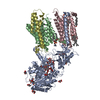 7y5tMC 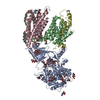 7y5xC 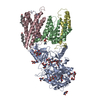 7y5zC M: atomic model generated by this map C: citing same article ( |
|---|---|
| Similar structure data | Similarity search - Function & homology  F&H Search F&H Search |
- Links
Links
| EMDB pages |  EMDB (EBI/PDBe) / EMDB (EBI/PDBe) /  EMDataResource EMDataResource |
|---|---|
| Related items in Molecule of the Month |
- Map
Map
| File |  Download / File: emd_33624.map.gz / Format: CCP4 / Size: 125 MB / Type: IMAGE STORED AS FLOATING POINT NUMBER (4 BYTES) Download / File: emd_33624.map.gz / Format: CCP4 / Size: 125 MB / Type: IMAGE STORED AS FLOATING POINT NUMBER (4 BYTES) | ||||||||||||||||||||
|---|---|---|---|---|---|---|---|---|---|---|---|---|---|---|---|---|---|---|---|---|---|
| Annotation | CryoEM structure of human PS1-containing gamma-secretase in complex with MRK-560 | ||||||||||||||||||||
| Voxel size | X=Y=Z: 1.0825 Å | ||||||||||||||||||||
| Density |
| ||||||||||||||||||||
| Symmetry | Space group: 1 | ||||||||||||||||||||
| Details | EMDB XML:
|
-Supplemental data
-Half map: #2
| File | emd_33624_half_map_1.map | ||||||||||||
|---|---|---|---|---|---|---|---|---|---|---|---|---|---|
| Projections & Slices |
| ||||||||||||
| Density Histograms |
-Half map: #1
| File | emd_33624_half_map_2.map | ||||||||||||
|---|---|---|---|---|---|---|---|---|---|---|---|---|---|
| Projections & Slices |
| ||||||||||||
| Density Histograms |
- Sample components
Sample components
-Entire : PS1-containing gamma-secretase in complex with MRK-560
| Entire | Name: PS1-containing gamma-secretase in complex with MRK-560 |
|---|---|
| Components |
|
-Supramolecule #1: PS1-containing gamma-secretase in complex with MRK-560
| Supramolecule | Name: PS1-containing gamma-secretase in complex with MRK-560 type: complex / Chimera: Yes / ID: 1 / Parent: 0 / Macromolecule list: #1-#4 |
|---|---|
| Source (natural) | Organism:   Homo sapiens (human) Homo sapiens (human) |
| Recombinant expression | Organism:   Homo sapiens (human) Homo sapiens (human) |
-Macromolecule #1: Nicastrin
| Macromolecule | Name: Nicastrin / type: protein_or_peptide / ID: 1 / Number of copies: 1 / Enantiomer: LEVO |
|---|---|
| Source (natural) | Organism:   Homo sapiens (human) Homo sapiens (human) |
| Molecular weight | Theoretical: 78.48357 KDa |
| Recombinant expression | Organism:   Homo sapiens (human) Homo sapiens (human) |
| Sequence | String: MATAGGGSGA DPGSRGLLRL LSFCVLLAGL CRGNSVERKI YIPLNKTAPC VRLLNATHQI GCQSSISGDT GVIHVVEKEE DLQWVLTDG PNPPYMVLLE SKHFTRDLME KLKGRTSRIA GLAVSLTKPS PASGFSPSVQ CPNDGFGVYS NSYGPEFAHC R EIQWNSLG ...String: MATAGGGSGA DPGSRGLLRL LSFCVLLAGL CRGNSVERKI YIPLNKTAPC VRLLNATHQI GCQSSISGDT GVIHVVEKEE DLQWVLTDG PNPPYMVLLE SKHFTRDLME KLKGRTSRIA GLAVSLTKPS PASGFSPSVQ CPNDGFGVYS NSYGPEFAHC R EIQWNSLG NGLAYEDFSF PIFLLEDENE TKVIKQCYQD HNLSQNGSAP TFPLCAMQLF SHMHAVISTA TCMRRSSIQS TF SINPEIV CDPLSDYNVW SMLKPINTTG TLKPDDRVVV AATRLDSRSF FWNVAPGAES AVASFVTQLA AAEALQKAPD VTT LPRNVM FVFFQGETFD YIGSSRMVYD MEKGKFPVQL ENVDSFVELG QVALRTSLEL WMHTDPVSQK NESVRNQVED LLAT LEKSG AGVPAVILRR PNQSQPLPPS SLQRFLRARN ISGVVLADHS GAFHNKYYQS IYDTAENINV SYPEWLSPEE DLNFV TDTA KALADVATVL GRALYELAGG TNFSDTVQAD PQTVTRLLYG FLIKANNSWF QSILRQDLRS YLGDGPLQHY IAVSSP TNT TYVVQYALAN LTGTVVNLTR EQCQDPSKVP SENKDLYEYS WVQGPLHSNE TDRLPRCVRS TARLARALSP AFELSQW SS TEYSTWTESR WKDIRARIFL IASKELELIT LTVGFGILIF SLIVTYCINA KADVLFIAPR EPGAVSY |
-Macromolecule #2: Presenilin-1
| Macromolecule | Name: Presenilin-1 / type: protein_or_peptide / ID: 2 / Number of copies: 1 / Enantiomer: LEVO EC number:  Hydrolases; Acting on peptide bonds (peptidases); Aspartic endopeptidases Hydrolases; Acting on peptide bonds (peptidases); Aspartic endopeptidases |
|---|---|
| Source (natural) | Organism:   Homo sapiens (human) Homo sapiens (human) |
| Molecular weight | Theoretical: 52.713535 KDa |
| Recombinant expression | Organism:   Homo sapiens (human) Homo sapiens (human) |
| Sequence | String: MTELPAPLSY FQNAQMSEDN HLSNTVRSQN DNRERQEHND RRSLGHPEPL SNGRPQGNSR QVVEQDEEED EELTLKYGAK HVIMLFVPV TLCMVVVVAT IKSVSFYTRK DGQLIYTPFT EDTETVGQRA LHSILNAAIM ISVIVVMTIL LVVLYKYRCY K VIHAWLII ...String: MTELPAPLSY FQNAQMSEDN HLSNTVRSQN DNRERQEHND RRSLGHPEPL SNGRPQGNSR QVVEQDEEED EELTLKYGAK HVIMLFVPV TLCMVVVVAT IKSVSFYTRK DGQLIYTPFT EDTETVGQRA LHSILNAAIM ISVIVVMTIL LVVLYKYRCY K VIHAWLII SSLLLLFFFS FIYLGEVFKT YNVAVDYITV ALLIWNFGVV GMISIHWKGP LRLQQAYLIM ISALMALVFI KY LPEWTAW LILAVISVYD LVAVLCPKGP LRMLVETAQE RNETLFPALI YSSTMVWLVN MAEGDPEAQR RVSKNSKYNA EST ERESQD TVAENDDGGF SEEWEAQRDS HLGPHRSTPE SRAAVQELSS SILAGEDPEE RGVKLGLGDF IFYSVLVGKA SATA SGDWN TTIACFVAIL IGLCLTLLLL AIFKKALPAL PISITFGLVF YFATDYLVQP FMDQLAFHQF YI |
-Macromolecule #3: Gamma-secretase subunit APH-1A
| Macromolecule | Name: Gamma-secretase subunit APH-1A / type: protein_or_peptide / ID: 3 / Number of copies: 1 / Enantiomer: LEVO |
|---|---|
| Source (natural) | Organism:   Homo sapiens (human) Homo sapiens (human) |
| Molecular weight | Theoretical: 29.017943 KDa |
| Recombinant expression | Organism:   Homo sapiens (human) Homo sapiens (human) |
| Sequence | String: MGAAVFFGCT FVAFGPAFAL FLITVAGDPL RVIILVAGAF FWLVSLLLAS VVWFILVHVT DRSDARLQYG LLIFGAAVSV LLQEVFRFA YYKLLKKADE GLASLSEDGR SPISIRQMAY VSGLSFGIIS GVFSVINILA DALGPGVVGI HGDSPYYFLT S AFLTAAII ...String: MGAAVFFGCT FVAFGPAFAL FLITVAGDPL RVIILVAGAF FWLVSLLLAS VVWFILVHVT DRSDARLQYG LLIFGAAVSV LLQEVFRFA YYKLLKKADE GLASLSEDGR SPISIRQMAY VSGLSFGIIS GVFSVINILA DALGPGVVGI HGDSPYYFLT S AFLTAAII LLHTFWGVVF FDACERRRYW ALGLVVGSHL LTSGLTFLNP WYEASLLPIY AVTVSMGLWA FITAGGSLRS IQ RSLLCRR QEDSRVMVYS ALRIPPED |
-Macromolecule #4: Gamma-secretase subunit PEN-2
| Macromolecule | Name: Gamma-secretase subunit PEN-2 / type: protein_or_peptide / ID: 4 / Number of copies: 1 / Enantiomer: LEVO |
|---|---|
| Source (natural) | Organism:   Homo sapiens (human) Homo sapiens (human) |
| Molecular weight | Theoretical: 12.038029 KDa |
| Recombinant expression | Organism:   Homo sapiens (human) Homo sapiens (human) |
| Sequence | String: MNLERVSNEE KLNLCRKYYL GGFAFLPFLW LVNIFWFFRE AFLVPAYTEQ SQIKGYVWRS AVGFLFWVIV LTSWITIFQI YRPRWGALG DYLSFTIPLG TP |
-Macromolecule #7: 2-acetamido-2-deoxy-beta-D-glucopyranose
| Macromolecule | Name: 2-acetamido-2-deoxy-beta-D-glucopyranose / type: ligand / ID: 7 / Number of copies: 6 / Formula: NAG |
|---|---|
| Molecular weight | Theoretical: 221.208 Da |
| Chemical component information |  ChemComp-NAG: |
-Macromolecule #8: 1,2-DIACYL-SN-GLYCERO-3-PHOSPHOCHOLINE
| Macromolecule | Name: 1,2-DIACYL-SN-GLYCERO-3-PHOSPHOCHOLINE / type: ligand / ID: 8 / Number of copies: 2 / Formula: PC1 |
|---|---|
| Molecular weight | Theoretical: 790.145 Da |
| Chemical component information | 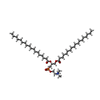 ChemComp-PC1: |
-Macromolecule #9: ~{N}-[4-[2,5-bis(fluoranyl)phenyl]-4-(4-chlorophenyl)sulfonyl-cyc...
| Macromolecule | Name: ~{N}-[4-[2,5-bis(fluoranyl)phenyl]-4-(4-chlorophenyl)sulfonyl-cyclohexyl]-1,1,1-tris(fluoranyl)methanesulfonamide type: ligand / ID: 9 / Number of copies: 1 / Formula: IGD |
|---|---|
| Molecular weight | Theoretical: 517.918 Da |
| Chemical component information | 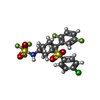 ChemComp-IGD: |
-Macromolecule #10: CHOLESTEROL
| Macromolecule | Name: CHOLESTEROL / type: ligand / ID: 10 / Number of copies: 3 / Formula: CLR |
|---|---|
| Molecular weight | Theoretical: 386.654 Da |
| Chemical component information | 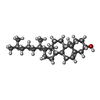 ChemComp-CLR: |
-Experimental details
-Structure determination
| Method |  cryo EM cryo EM |
|---|---|
 Processing Processing |  single particle reconstruction single particle reconstruction |
| Aggregation state | particle |
- Sample preparation
Sample preparation
| Buffer | pH: 7.4 |
|---|---|
| Vitrification | Cryogen name: ETHANE |
- Electron microscopy
Electron microscopy
| Microscope | FEI TITAN KRIOS |
|---|---|
| Electron beam | Acceleration voltage: 300 kV / Electron source:  FIELD EMISSION GUN FIELD EMISSION GUN |
| Electron optics | Illumination mode: FLOOD BEAM / Imaging mode: BRIGHT FIELD Bright-field microscopy / Nominal defocus max: 1.8 µm / Nominal defocus min: 1.5 µm Bright-field microscopy / Nominal defocus max: 1.8 µm / Nominal defocus min: 1.5 µm |
| Image recording | Film or detector model: GATAN K3 (6k x 4k) / Average electron dose: 50.0 e/Å2 |
| Experimental equipment |  Model: Titan Krios / Image courtesy: FEI Company |
- Image processing
Image processing
| Startup model | Type of model: EMDB MAP EMDB ID: |
|---|---|
| Initial angle assignment | Type: MAXIMUM LIKELIHOOD |
| Final angle assignment | Type: MAXIMUM LIKELIHOOD |
| Final reconstruction | Resolution.type: BY AUTHOR / Resolution: 2.9 Å / Resolution method: FSC 0.143 CUT-OFF / Number images used: 127676 |
 Movie
Movie Controller
Controller


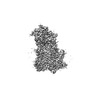
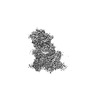










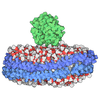

 Z
Z Y
Y X
X


















